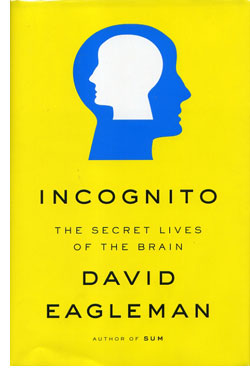 |
 |
 David Eagleman
David Eagleman
Incognito: The Secret Lives of the Brain
Reviewed by: Rick Kleffel © 2011
Pantheon / Random House
US Hardcover First Edition
ISBN 978-0-307-37733-3
Publication Date: 05-31-2011
301 Pages ; $26.95
Date Reviewed: 07-17-2011
Index:
Non Fiction
Science Fiction
We like to believe that we know who "we" are. Each of us supposes that the consciousness that wakes up in the morning comprises pretty much all of "me." David Eagleman has a very different idea, one that is supported by a whole lot of science, entertainingly documented in 'Incognito,' which upends our notion of "I." Eagleman's exploration of the mind we do not know is a gripping and engaging thought experiment that manages to actually "think out of the box," an "action" whose difficulty is made startlingly clear by the very text that manages to do so.
Eagleman may be writing science fact, but he's perfectly at home using the tools of literature and in particular, science fiction to make the facts and perceptions his work offers clear. His premise is essentially that the conscious "I" who wakes up in the morning is very much indeed like the captain of a huge ocean liner; that is, mostly a figurehead along for the ride on a machine so complicated that no single "I" can really wrap the "I" that they generally consider their "brain" around all or even most of the parts of that enterprise. Eyes are not cameras and ears are not tape recorders. The evidence of the senses is not a real-time feed from objective reality, but instead, a calculated, low-resolution guess manufactured by a super-complicated mass of cells in your skull. It's a pretty damn good guess, though, one that enables some superb physical feats for which the puny "I' will erroneously take the lion's share of the credit.
Eagleman is a very smart scientist, bursting with grand ideas, but more importantly, he is also a grand communicator, able to convey those ideas to those who might not come up with them on their own steam. 'Incognito' is funny, gripping and often shocking. His case histories are bizarrely compelling but ultimately offer crystal clear examples of how the mind works. His analogies and metaphors are charmingly well-written; we would expect nothing less from the author of 'Sum.' On the prose level, Eagleman writes great sentences of the sort that you might inclined to read to those in your general vicinity as he makes his case for the "dethronement" of the mind doing the reading, and for that matter, the writing.
But Eagleman wants to do much more than inform us that we are not really "we" and we aren't really in charge. He pursues the implications of his thesis and his work into philosophical and legal realms. Free will? Probably not. Crime and punishment? Soon to be as outdated as those orreries with the earth in the center of the solar system. Eagleman is relentless as he hunts down notions of blame and responsibility. His conclusions are bond to make some readers uncomfortable. Not surprisingly, he's very comfortable with that notion.
But no matter how disturbing some of Eagleman's idea may be, his writing is impeccable. Lively prose serves a well-organized series of arguments and visions. And while the dethronement of the self may seem to be a depressing realization, Eagleman is able to use his skills as a writer to convince the dethroned that this is not the case. He envisions our minds opening up to ideas as foreign to us as notion of a galaxy might have been to Pope Urban VIII, who found Galileo "vehemently suspect of heresy."
Notions of human boot sectors are interwoven with stories of men who have iron tamping rods driven through their brains. By the time you finish reading 'Incognito' you might feel very sympathetic towards all those folks who had chunks of metal embedded in their skulls. But it's only David Eagleman, proving that ideas can be just as dangerous as we all thought possible. We seem to be constantly at risk of escaping our shackles. Reading proves to be a good way to break free. It has history behind it, and now, with 'Incognito,' David Eagleman is well in front.
|
 |
|
|
 |
| |
Review Archive
All Reviews alphabetized by author.
General Fiction
Non-Genre, general fiction and literature.
Horror
Supernatural fiction, supernatural horror and non-supernatural horror.
Science Fiction
Science fiction, science fantasy, speculative fiction, alternate history.
Fantasy
Fantasy, surrealism and magic realism.
Mystery
Crime, thrillers, mystery, suspense.
Non-Fiction
Non-Fiction, True Crime, Forteana, Reference.
Poetry
|
|
 |
|




